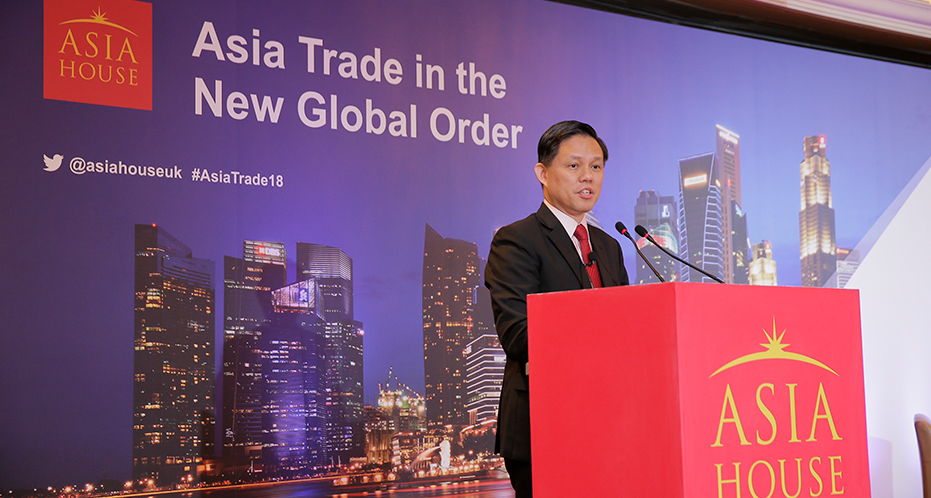Driving commercial and political engagement between Asia, the Middle East and Europe
Driving commercial and political engagement between Asia, the Middle East and Europe
Driving commercial and political engagement between Asia, the Middle East and Europe

From the US-China trade war to the race for supremacy in Artificial Intelligence, the drivers of change in the global trade system were the focus Asia House’s major trade dialogue in Singapore: Asia Trade in the New Global Order.
The conference brought together 18 thought leaders on trade, technology and policy and more than 300 delegates to discuss the most pressing issues facing the global economy today.
His Excellency Chan Chun Sing, Minister for Trade and Industry, Singapore, opened the conference with a keynote speech outlining three issues that will define the future of trade: US-China relations; the UK and European Union’s approach to trade post Brexit; and Asia’s increasing influence in the economic order. He then took part in a Q&A with Asia House Chief Executive Michael Lawrence, who chaired the conference. The Minister fielded a range of questions from an engaged audience on issues such as the Belt and Road Initiative (BRI) and the UK’s potential accession to the CPTPP.
Shifting trade policies
All of these themes flowed into the conference’s first panel discussion, ‘The Shifting Trade Landscape in Asia and Beyond,’ which saw a lively debate between Dr Robert Koopman, Chief Economist, World Trade Organization; Luong Huong Thai, Director-General of the Multilateral Trade Policy Department, Ministry of Commerce of Vietnam, Dr Wang Huiyao, Founder and President, Center for China and Globalization; Steven Okun, Senior Advisor, McLarty Associates; and Anne Ruth Herkes, Former State Secretary, German Federal Ministry for Economic Affairs and Energy.
US-China relations was a key focus of the discussion, in which the panellists assessed the respective trade approaches of the world’s two largest economies and shared their predictions on what is likely to happen next in the trade war.
The digital revolution
Policy is one force reshaping the trade landscape. Technology is another. Emerging tech such as Artificial Intelligence (AI) and blockchain will transform both global business and global society. This was an issue explored by Dr Kai-Fu Lee, one of the world’s leading authorities on AI and innovation, in a keynote speech and presentation, followed by a Q&A with Michael Lawrence. Dr Lee highlighted the differences between the US and China in the AI environment, with Silicon Valley well ahead in terms of research, but China having access to much greater data sets, which is key to AI advancement.
How new technologies will impact on business in practical terms was explored in the second panel, ‘Creating a Digital Ecosystem.’
Kiren Kumar, Assistant Managing Director, Singapore Economic Development Board; Sopnendu Mohanty, Chief FinTech Officer, Monetary Authority of Singapore; Marcus Treacher, Senior Vice President of Customer Success, Ripple; and Syed Shahid Hussain, Managing Partner, Financial Services Sector for ASEAN, IBM, discussed a range of issues from regulation to the different approaches to ASEAN markets being taken by Chinese and US tech firms.
The perspective of one of the world’s leading digital companies was provided by Maya Hari, Vice President, Asia Pacific, Twitter, who highlighted some of the issues that major tech firms were currently focusing on, including the shifts in data ideology and the fragmentation of the internet.
Belt and Road Initiative
The conversation then turned to the Belt and Road Initiative, a topic that was at the heart of tensions at the recent APEC summit. Donald Kanak, Chairman of Eastspring Investments; Gregory Hodkinson, Chairman of Arup Group Limited; Professor Xiang Bing, Dean of the Cheung Kong Graduate School of Business; Goh Sui Noi, China Bureau Chief of The Straits Times took part in the final panel, ‘The Politics of the Belt and Road,’ debating several aspects of the programme, including financing, the diversity of opinion on the BRI, and social tensions in host countries.
Asia Trade in the New Global Order, which was sponsored by Arup, Prudential and ABP with The Straits Times as the official media partner, played an important role in pushing the trade conversation forward. As Lord Green, Chairman of Asia House said in a comment piece ahead of the dialogue: “Its timing could not be more pertinent.”
Watch the conference in full
